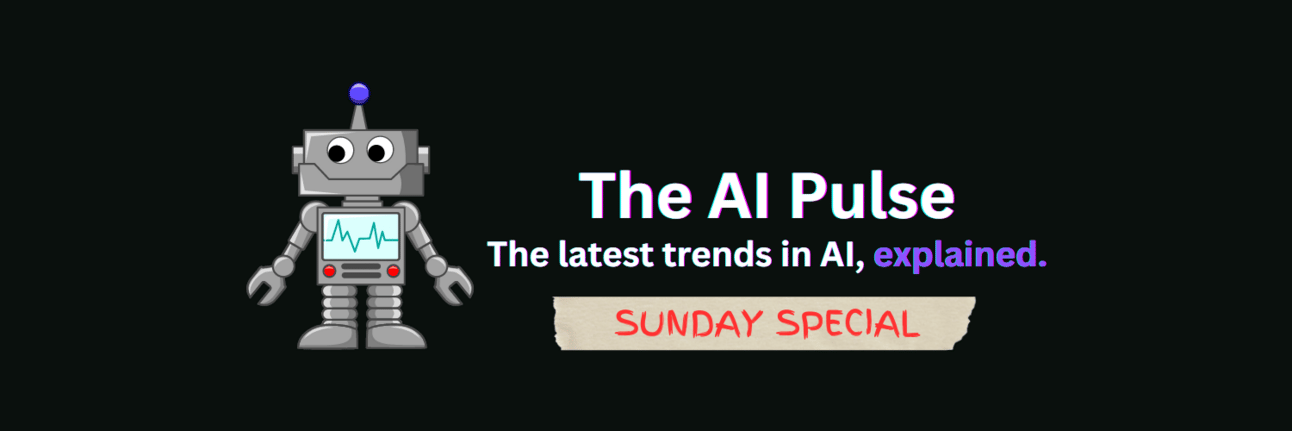
Welcome back AI prodigies!
In today’s Sunday Special:
🧩The Truth is Hard to Come By
🤖Is AI Our Savior?
⚔️Google Versus Consensus
💥Bonus Tip: Optimize Consensus Prompts
Read Time: 6 minutes
Disclaimer
The AI Pulse has no affiliation with Consensus. The following newsletter is a voluntary, no-strings-attached exploration of Consensus’s search tool. We aim to highlight the importance of objective truth in the information age and Consensus’s value proposition versus competing search offerings.
🧩THE TRUTH IS HARD TO COME BY
The truth has been elusive for as long as the sky has been blue. Still, some truths are easier to establish, propagate, and accept than others. Objective truths, at least according to philosophical realists, exist regardless of how anyone perceives them. In other words, objective truth is not in the eye of the beholder; for instance, it’s objectively true that the Earth revolves around the Sun. But we often crave answers to murkier or open-ended questions: Does spanking impact childhood development? Does poverty cause crime? Does lowering taxes increase economic growth? What are the benefits of meditation? Objective answers may be what we’re after, yet more often than not, what we feel to be true is inherently subjective.
Subjective truths exist in the eyes of the beholder; for instance, I feel like intelligence is purely genetic. Somewhere in the middle lies normative truth, which are subjective truths that groups agree on; for instance, Kanye West, given his latest fiascos, is irredeemable.
Regardless of dataset quality, parameter quantity, fine-tuning, etc., algorithms cannot intelligently wrestle with subjective or normative truths. Although today’s models are increasingly more precise, we cannot intentionally encode the “right” mix of human bias into a machine-learning model. Since we don’t fully understand the complex sources of bias, we can’t replicate its pervasive effect on truth-finding.
🤖IS AI OUR SAVIOR?
We now turn to the relationship between objective truths and AI. Can AI bring us a world teeming with, not sparsely populated by, objective truth? Not directly, at least not yet. Models are only as good as their assumptions. The best tool we have to produce reliable knowledge is the scientific method. Of course, only researchers on the front lines of knowledge production are privy to the process, nuances, and limitations of establishing objective truth. The rest of us often consume garbage processed and recycled by media outlets, social media algorithms, and content creators. They maximize engagement, retention, and other so-called KPIs, which the technocratic class worships. And scientists tend to present their findings in exclusive, elite spaces—institutes, academies, board rooms, and the like. And if the heads of three-letter agencies dare to share science-based recommendations, they’ll likely do more harm than good. If tomorrow the CDC declared a pandemic due to a novel virus with a death rate of 10% (at least 100 times more deadly than COVID-19), a quarter of Americans wouldn’t believe them.
AI, specifically large-language models (LLMs), circumvents the media middleman. But not via text-generating, hallucinating chatbots. Humans are the most robust BS detectors. LLMs, like Consensus, can parse scientific journals to provide evidence-based answers to pressing questions in plain English.
⚔️GOOGLE VERSUS CONSENSUS
Let’s examine one of the queries posed earlier: “What are the benefits of mindfulness meditation?”
Google Search spits out a “featured snippet” from a reputable source (Mayo Clinic):
The emotional and physical benefits of mediation can include:
• Gaining a new perspective on stressful situations.
• Building skills to manage your stress.
• Increase self-awareness.
• Focusing on the present.
• Reducing negative emotions.
• Increasing imagination and creativity.
• Increasing patience and tolerance.
Google Bard provides a summary of benefits. Since it generates original content, it fails to cite sources:
Meditation has been shown to have a wide range of benefits for both physical and mental health. Some of the most well-known benefits include:
• Reduced stress and anxiety: Meditation can help to calm the mind and body, and reduce the production of stress hormones. This can lead to a number of positive benefits, such as improved mood, better sleep quality, and reduced pain.
• Increased focus and attention: Meditation can help to train the mind to focus more effectively and to be less distracted. This can be beneficial in both personal and professional settings.
• Improved emotional regulation: Meditation can help people to become more aware of their emotions and to develop healthier coping mechanisms. This can lead to reduced emotional reactivity and improved overall well-being.
• Increased self-awareness: Meditation can help people to develop a deeper understanding of themselves and their thoughts, feelings, and behaviors. This can lead to greater self-acceptance and compassion.
• Improved cognitive function: Meditation has been shown to improve a number of cognitive functions, such as memory, attention, and decision-making.
What about a more involved query like “Does spanking impact childhood development?” Chatbots aren’t even worth trying.
Again, Google provides an answer from a reputable source. However, the plain English answer relies solely on the latest research. It also spits out research publications, but deriving any benefit requires parsing through the Abstract, Data, Results, and Conclusion sections.
Scholarly articles for Does spanking impact childhood development?
Spanking children: The controversies, findings, and … - Benjet - Cited by 272
Spanking and child development: We know enough … - Gershoff - Cited by 368
Spanking and child development during the first 5 … - Maguire-Jack - Cited by 129
Research has long underscored the negative effects of spanking on children's social-emotional development, self-regulation, and cognitive development, but new research, published this month, shows that spanking alters children's brain response in ways similar to severe maltreatment and increases perception of threats.
Competing chatbots such as Claude2 and Llama 2 specialize in dialogue, not information retrieval. Nevertheless, Google Search seems adequate, as it makes credible information accessible. But for less common scientific questions, Search falls short.
🧬Consensus
Consensus produces similar answers but with direct citations. Double-click on each study and replicate the exact meditation practices of research participants to increase your probability of realizing the intended benefit. The results are more detailed and practical, but certainly not life-changing.

Consensus is clearly more comprehensive with its GPT-4-powered summaries. It gives you the agency to explore the nuances of multiple studies. For instance, one study focuses on spanking in diverse populations (Black and Hispanic children). Further, the Consensus Meter answers yes or no questions probabilistically, given ample quality publications:

✏️BONUS TIP: OPTIMIZE CONSENSUS PROMPTS
Optimal Queries Ask:
Simple Yes or No Questions → Consensus Meter
About the Impact, Effect, Benefits, or Drawbacks of a Concept → GPT-4-Powered Summary
Less Optimal Queries Ask:
For a Specific Number (Hit or Miss)
For the Best Something (Too Subjective)
How to Do Something (Unscientific Language)
Two Concepts Are Separated by “and” (Too Vague)
💥CONCLUSION
Consensus combines the user-friendliness of ChatGPT, the scientific rigor of top journals, and the breadth of Google Search. The next time you have a question (that scientists have likely researched), skip Search, bypass "the experts," and go straight to the studies.
📒FINAL NOTE
If you found this useful, follow us on Twitter or provide honest feedback below. It helps us improve our content.
How was today’s newsletter?
❤️AI Pulse Review of The Week
“I’m loving the Sunday Special newsletters. Keep’em coming!”
🎁NOTION TEMPLATES
🚨Subscribe to our newsletter for free and receive these powerful Notion templates:
⚙️150 ChatGPT prompts for Copywriting
⚙️325 ChatGPT prompts for Email Marketing
📆Simple Project Management Board
⏱Time Tracker
